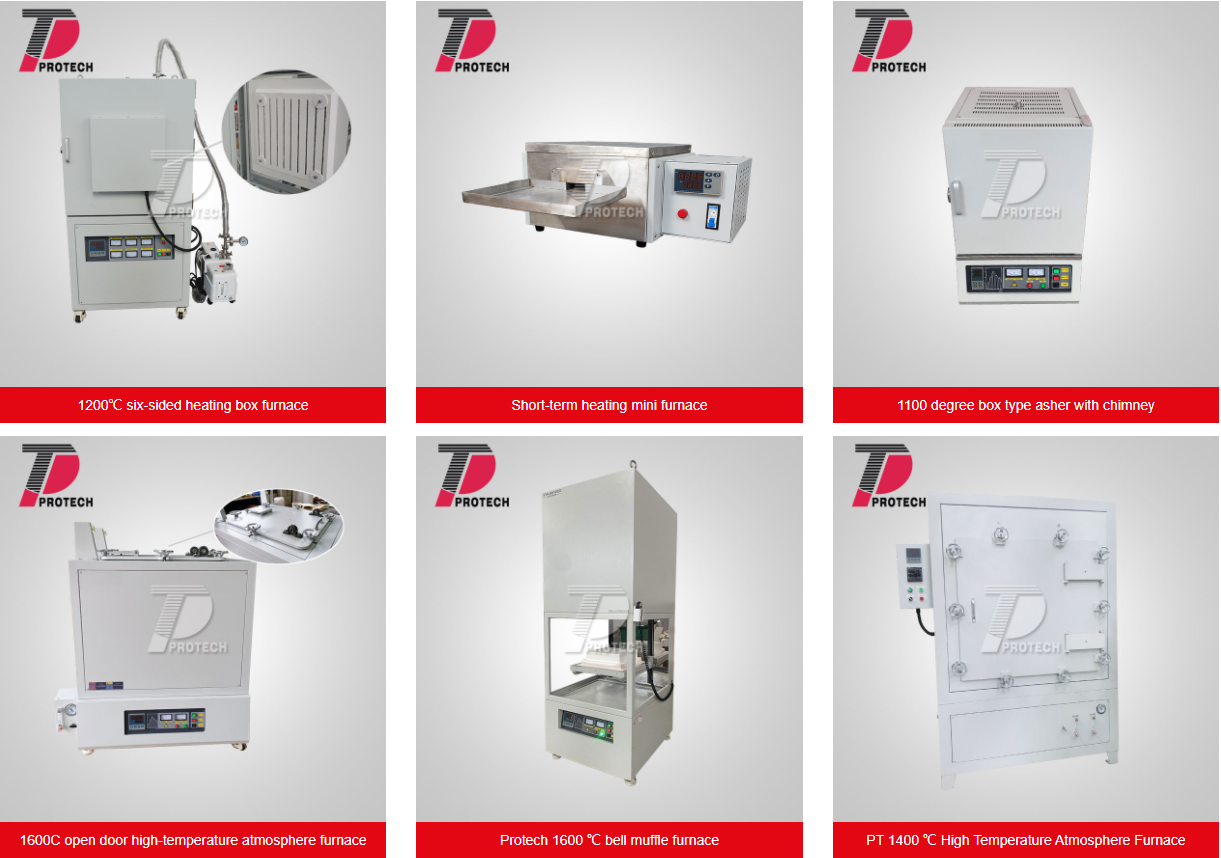

EXPLORE THE NEW TRENDS AND ADVANCED TECHNOLOGIES IN THE HEAT TREATMENT EQUIPMENT INDUSTRY
Ask for a free consultation Ask for technical support

Tel

WhatsApp/WeChat
Contact Us
All products are customizable, leave message immediately, we will reply as soon as possible.
Box furnace, also known as muffle furnace, is a common laboratory heating equipment. It is easy to operate and easy to maintain, and is equipped with a controllable chimney behind the furnace. It is mainly used for experimental operations such as heating, melting, sintering, and ashing of various materials, especially suitable for chemical analysis of coal, coking products, and chemical raw materials. It is also widely used in industries and departments such as electricity, coal, papermaking, petrochemicals, cement, agriculture and animal husbandry, pharmaceutical research, and teaching.

The main categories of box furnaces (click to view more box furnaces)
1、 The structure and working principle of a box furnace
① Furnace structure: Laboratory electric furnaces are usually made of stainless steel or high-temperature resistant materials, with heating elements inside the furnace chamber and control panels located outside the furnace body.
② Heating element: The heating element can be a resistance wire, an electric heating tube, etc., which generates heat through the flow of current, causing the furnace chamber to heat up.
③ Temperature control: Advanced temperature control systems include temperature sensors, PID controllers, etc., ensuring precise temperature control for experiments.
2、 The application scope of box furnace
① Ceramics and Glass Industry: Box furnaces can be used for experiments such as firing, sintering, and melting of ceramics and glass materials, controlling temperature and atmosphere conditions to prepare high-performance ceramics and glass materials.
② Metal heat treatment: Box furnace can be used for heat treatment of metal materials, such as annealing, quenching, tempering, etc., to change the microstructure and properties of metal materials, improve their mechanical properties and corrosion resistance.
③ Chemical analysis: Box furnaces can be used for heating various chemical reactions, such as hydrolysis, oxidation, reduction, etc. They can also be used as heating equipment for sample processing, such as ashing furnaces, melting furnaces, etc.
④ In the field of environmental protection, box furnaces can be used to treat various types of waste, such as exhaust gas, waste liquid, solid waste, etc., and convert them into harmless substances through high-temperature incineration or melting methods.
⑤ In the field of new energy, box furnaces can be used for the production and research and development of solar panels, as well as the preparation of electrode materials for fuel cells.
⑥ In the field of food processing: Box ovens can be used for the baking, baking, steaming and other processing processes of food, such as the production of bread, biscuits, meat and other foods.
⑦ Agricultural field: Box furnaces can be used for soil disinfection, seed treatment, greenhouse heating and other agricultural fields to improve crop yield and quality.
⑧ Research field: Box furnaces can be used for various research experiments, such as heating, melting, sintering, and other experimental operations in materials science, chemistry, biology, and other fields.
⑨ Chemical experiment: used for heating chemical reactions, such as solution concentration, solvent evaporation, etc.
⑩ Sample drying: used to dry experimental samples to remove moisture for subsequent analysis.
⑪ Material thermal decomposition: used to study the thermal decomposition properties of substances at high temperatures.
⑫ Crystal growth: In materials science experiments, it is used to control temperature to promote crystal growth.
⑬ Solid phase reaction: used to study the solid phase reaction process of substances under high temperature conditions.
3、 Characteristics of Box Stove
① Small and portable: Laboratory electric stoves are usually designed to be small and portable, suitable for small spaces on laboratory countertops.
② Accurate temperature control: The advanced temperature control system ensures precise temperature control during experiments, improving the repeatability of the experiment.
③ Easy to operate: The control panel is usually designed to be simple and intuitive, easy to operate, and suitable for the needs of laboratory personnel.
④ Multifunctionality: Laboratory electric furnaces usually have multiple working modes that can adapt to different experimental needs, such as heating, constant temperature, cooling, etc.
⑤ Cheap price: Box furnaces have a simple structure and lower manufacturing costs, making them relatively cheaper compared to other heat treatment products.
4、 Precautions for purchasing box type furnaces
① Heating element selection: Select suitable heating elements according to experimental requirements, such as resistance wires, electric heating tubes, etc.
② Temperature range: Select the appropriate temperature range according to the experimental requirements to ensure that the electric furnace can meet the temperature requirements of the experiment.
③ Control System: Understand the temperature control system of the electric furnace to ensure that it meets the precise temperature control requirements of the experiment.
④ Safety and certification: Ensure that the laboratory electric furnace complies with relevant safety standards and certification requirements to ensure safety during the experimental process.
Summary: Laboratory electric furnaces play an important role in scientific research and teaching experiments, and their flexibility and ease of use make them common heating equipment in laboratories. The selection of a suitable laboratory electric furnace should be comprehensively considered based on specific experimental requirements and equipment performance. Click to consult online customer service to learn more about box furnace knowledge!